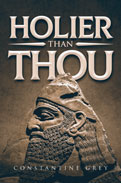
 |
In his intellectual critique of religion—specifically Christianity, Judaism, and Islam—Grey offers a reasoned and multifaceted criticism, grounded in the actual words and precepts of the holy texts themselves. He argues that "negative content" of the religious books prescribes "death threats" to innocent non-believers, "willful promotion of hatred," slavery, and historical examples of genocidal reigns of terror, wherein the citing of scripture has often been used to justify such activity. Grey argues that "carrying out of literal instructions from the holy books" has resulted in wars and "serious crimes against humanity" over the past two millennia. He then turns to the notion of religion as a (tax-exempt) business and offers a detailed examination of religion and crime rates. Grey considers whether "the increasing trend towards secularism" has actually led to "an increase in immorality."
It should be noted that the author does not simply set out to blindly bash religion. Grey points to very real instances where positive benefits have occurred through human society's religions. That being said, the author's work—focusing on the harms perpetrated against entire groups of human beings in the name of religion—is well researched, based upon accurate historical frameworks, and considered in terms of the precepts and "commandments" from the religious texts themselves. It is fair to say the book's general thesis may not appeal to many readers for whom religion is a defining part of one's personal identity. However, as Grey argues, religion itself has long been granted a "free pass," wherein the freethinking non-adherent has been rather unforgivingly cast aside. "When we cut through all the rituals, ceremony, and supernatural," Grey writes, "we find that religion is simply one small group of people telling a much larger group of people what to think and how to behave."